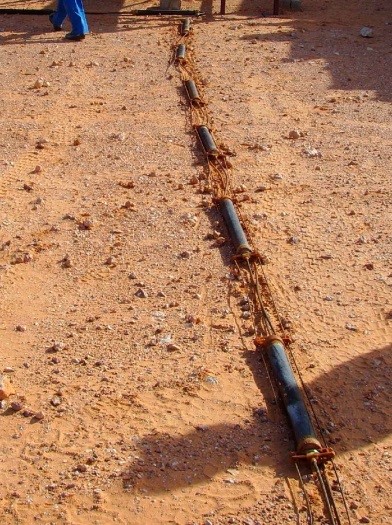 Deep well anode groundbeds are specially designed and installed as a part of an impressed current cathodic protection (ICCP) system to provide a relatively high amount of CP current to structures such as well casings. The selection of appropriate anode material is important to achieve long anode life based on consumption rates. During the 1980s, one of the largest national oil companies in North Africa had negative experiences with the CP of its well casings due to constant failure of the anode systems after a relatively short operational period (one to five years). The anode systems were installed in areas where the soil and/or water contain a high chloride concentration, which is often the case in many desert areas in North Africa and the Middle East. After carefully studying the reasons for the system failures, it was determined that the anodic reaction occurring around the anodes when installed in acidic saline solutions caused chlorine gas production at the anode/electrolyte interface and also a high chlorine gas concentration around the anodes and their components. The presence of chlorine gas is one of the major reasons for an anode groundbed failure. Laboratory tests in simulated environmental and service conditions showed that magnetite anodes were able to provide a more reliable and longer-lasting anode system than the previously used materials, with a minimum design life of 20-plus years under these extreme environmental conditions. The known threats to anode groundbed systems, various case studies of large-scale applications and the requirements for anode systems installed in high-chloride environments, as well as recent developments in improving and optimizing the reliability of the magnetite anode systems, are discussed in CORROSION 2014 paper no. 4470, “Magnetite Anodes for Deep Well Groundbeds,” by T. Krebs.
Deep well anode groundbeds are specially designed and installed as a part of an impressed current cathodic protection (ICCP) system to provide a relatively high amount of CP current to structures such as well casings. The selection of appropriate anode material is important to achieve long anode life based on consumption rates. During the 1980s, one of the largest national oil companies in North Africa had negative experiences with the CP of its well casings due to constant failure of the anode systems after a relatively short operational period (one to five years). The anode systems were installed in areas where the soil and/or water contain a high chloride concentration, which is often the case in many desert areas in North Africa and the Middle East. After carefully studying the reasons for the system failures, it was determined that the anodic reaction occurring around the anodes when installed in acidic saline solutions caused chlorine gas production at the anode/electrolyte interface and also a high chlorine gas concentration around the anodes and their components. The presence of chlorine gas is one of the major reasons for an anode groundbed failure. Laboratory tests in simulated environmental and service conditions showed that magnetite anodes were able to provide a more reliable and longer-lasting anode system than the previously used materials, with a minimum design life of 20-plus years under these extreme environmental conditions. The known threats to anode groundbed systems, various case studies of large-scale applications and the requirements for anode systems installed in high-chloride environments, as well as recent developments in improving and optimizing the reliability of the magnetite anode systems, are discussed in CORROSION 2014 paper no. 4470, “Magnetite Anodes for Deep Well Groundbeds,” by T. Krebs.